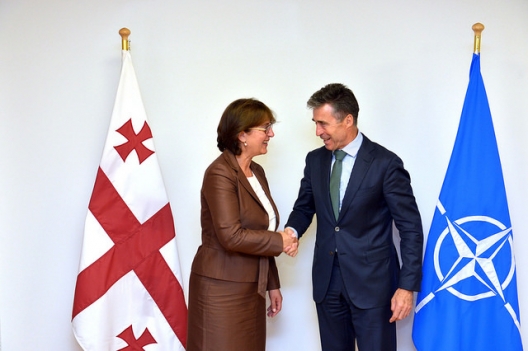 In the same week that the European Union signed an association agreement with Georgia on June 27, NATO officials meeting in Brussels decided not to offer the country a formal plan this year to achieve membership in the alliance. . . .
In the same week that the European Union signed an association agreement with Georgia on June 27, NATO officials meeting in Brussels decided not to offer the country a formal plan this year to achieve membership in the alliance. . . .
While Tbilisi does not accept the strategic argument against granting it a membership plan, it is coming to terms with it. But if Georgia is refused this plan, a concrete alternative will be essential. It should include a clear and present engagement of NATO in Georgia, such as a consistent presence of NATO trainers and advisers helping to modernize our military. This could begin anytime, and the presence of such Western nationals on Georgia’s territory would increase the potential hazards and costs to Russia of further attacks on Georgia.
In the medium term, such NATO engagement could include an investment such as a Center of Excellence for Mountain and Asymmetrical Warfare, perhaps with the participation of other Partnership for Peace countries, such as Austria, or even neutral countries, such as Switzerland. This could provide mentorship to help Georgia develop specific niche capabilities useful both to it and to NATO.
If the prevailing message emanating from NATO’s summit in Wales lacks such concrete engagement and instead suggests that the alliance is abandoning Georgia, sustaining stability in our country will become a daunting task. A NATO response that appears to be unprincipled appeasement of Russia – or a betrayal of countries that, like Georgia, has been members of NATO’s Partnership for Peace – will risk harming the deterrent credibility of the alliance.
Georgia, time and again, has stood by its allies as a dependable guarantor of stability in the region and beyond. Its progress has not been inevitable; it has required the consensus of political leadership and the unwavering support of public opinion. At the very minimum, this commitment must be recognized, cherished and cultivated. Ultimately, for as long as our allies cannot stand by our side in our region, they should empower us to defend the values and objectives we share. This commitment is possible and should become tangible.
Of NATO we ask: Please say all of this out loud in your summit communiqué. Be honest about Russia’s behavior and goals. Do not try to tame the bear with niceties about dialogue and cooperation in the Caucasus, for there are none. If NATO leaders make all of this clear, their unwillingness to move forward with the membership action plan still will be embarrassing for Georgians, but the sting will be reduced by this clear statement of support for our democratic, Western vocation. Please do not let us down.
Tedo Japaridze is chairman of the foreign affairs committee in Georgia’s parliament, where he represents the Georgian Dream coalition. He has served as Georgia’s national security advisor, foreign minister and ambassador to the United States. This article expresses his personal views.
Image: Georgian Foreign Minister Maia Panjikidze and Secretary General Anders Fogh Rasmussen, June 24, 2014 (photo: NATO)
